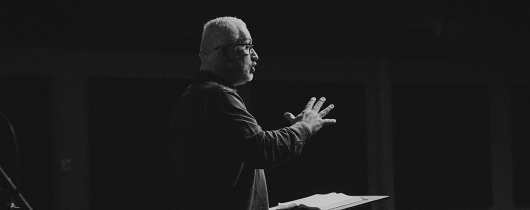Bear Witness | Atestiguar

St. Bernardine of Siena
Acts 22:30, 23:6-11; John 17:20-26
Christianity, like some other religions (e.g., Islam) is by its nature a missionary endeavor. Its adherents are called and expected to spread the faith to others. In our gospel reading, Jesus tells his Father in prayer, “I made known to them your name and I will make it known, that the love with which you loved me may be in them and I in them.” When the Lord appeared to Paul in a vision following his tumultuous appearance before the Sanhedrin, he assured him, “Take courage. For just as you have borne witness to the cause in Jerusalem, so you must also bear witness in Rome.”
This missionary dimension of our faith faces a number of challenges. Here in the USA, for example, we have a complicated relationship with religion. Our country is becoming increasingly religiously diverse and secularized. More people describe themselves as “spiritual but not religious.” There is ambivalence about the role of religion in politics and public life. Many people are content to relegate religion to the private sphere. However, this is difficult for those who take the call of Jesus and the mission of the church seriously. How should we proclaim the Good News today?
St. Bernardine of Siena was a Franciscan friar who lived in a time different than our own, but he was a great preacher. His advice to other preachers was simple, and included being brief, clear, and concise. His messages were filled with what St. Francis of Assisi called “vice and virtue, punishment and glory,” and he attracted crowds of up to 30,000. He is credited with reviving the practice of the Catholic faith in 15th century Italy.
A message that is strong, clear, brief, and concise never goes out of style. In the age of Twitter and Tik Tok, it is all the more necessary. - jc
-------------------------------------------------------------------------------------------------------------
San Bernardino de Siena
Hechos 22:30, 23:6-11; Juan 17:20-26
El cristianismo, al igual que otras religiones (por ejemplo, el Islam) es, por su naturaleza, una empresa misionera. Sus adeptos están llamados y se espera que difundan la fe a los demás. En nuestra lectura del Evangelio, Jesús dice a su Padre en oración: "Les he dado a conocer tu nombre y lo daré a conocer, para que el amor con que me has amado esté en ellos y yo en ellos". Cuando el Señor se le apareció a Pablo en una visión tras su tumultuosa comparecencia ante el Sanedrín, le aseguró: "Ten valor. Porque así como has dado testimonio de la causa en Jerusalén, también debes darlo en Roma".
Esta dimensión misionera de nuestra fe se enfrenta a una serie de retos. Aquí en Estados Unidos, por ejemplo, tenemos una relación complicada con la religión. Nuestro país es cada vez más diverso desde el punto de vista religioso y está más secularizado. Cada vez más personas se describen como "espirituales pero no religiosas". Hay ambivalencia sobre el papel de la religión en la política y la vida pública. Muchas personas se conforman con relegar la religión a la esfera privada. Sin embargo, esto es difícil para quienes se toman en serio la llamada de Jesús y la misión de la Iglesia. ¿Cómo debemos proclamar hoy la Buena Nueva?
San Bernardino de Siena fue un fraile franciscano que vivió en una época diferente a la nuestra, pero fue un gran predicador. Su consejo a otros predicadores era sencillo, e incluía ser breve, claro y conciso. Sus mensajes estaban llenos de lo que San Francisco de Asís llamaba "vicio y virtud, castigo y gloria", y atraía a multitudines de hasta 30.000 personas. Se le atribuye la reactivación de la práctica de la fe católica en la Italia del siglo XV.
Un mensaje fuerte, claro, breve y conciso nunca pasa de moda. En la era de Twitter y Tik Tok, es aún más necesario. - jc




